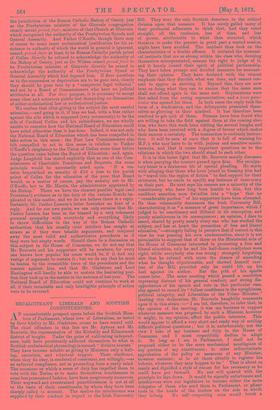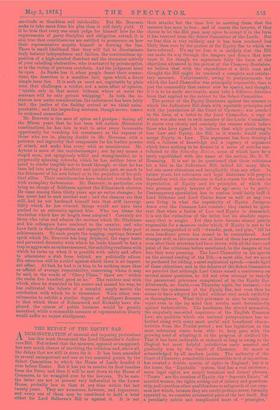RECALCITRANT LIBERALS AND SCOTTISH CONSTITUENCIES.
AN uncomfortable prospect opens before the Scottish Mem- bers of Parliament, whose love of Liberalism, as tested by their fidelity to Mr. Gladstone, seems to have waxed cold. The chief offenders in this line are Mr. Aytoun and Mr. Bouverie, the representative of the Kirkaldy and Kilmarnock district of burghs. Under the guise of cultivating independ- ence, both have persistently addicted themselves to what in Scottish ecclesiastical phraseologyis termed "divisive courses." They have become notable as giving to Ministers only a halt- ing, uncertain, and reluctant support. Their obedience, when they do obey, is rendered of constraint, not willingly,—as an enforced compliance, not as proceeding from a ready miad. The occasions on which a sense of duty has impelled them to vote with the Tories, or to make themselves troublesome in some leas pronounced fashion, have been suspiciously numerous. Their wayward and overstrained punctiliousness is not at all to the taste of their constituents, by whom they have been sharply called to account. The motive for interference was supplied by their conduct in regard to the Irish University Bill. They were the only Scottish deserters in the critical division upon that measure. It has sorely galled many of their provincial adherents to think that, had they voted straight, all the confusion, loss of time, and loss of power, attributable to what then occurred, which threaten to make the present in great part a wasted session, might have been avoided. The incident thus took on the characteristics of a double offence. It irritated the economi- cal instincts that are so strong within the class who, deeming themselves misrepresented, assume the right to judge of it, and it keenly roused their spirit of political partisanship. They have taken prompt and decided measures for announc- ing their opinion. They have declared with the utmost emphasis that they disrelish what was done, and cannot con- sent to appear as abetting it. Beyond this, they are now bent on doing what they can to ensure that the same men shall not offend again in the same sort. Explanations were first asked from the erring representatives, and a locus pceni- tentice was opened for them. In both cases the reply took the form of a vindication, and the delinquents presented them- selves as glorying in their misdeed. It has therefore been resolved to get quit of them. Persons have been found who are willing to take the field against them at the coming elec- tion, who have this week been visiting the several burghs, and who have been received with a degree of favour which makes their success a certainty. The transaction is curiously instruc- tive. It will be seen at once that it is full of warning for M.P.'s who may have to do with jealous and sensitive consti- tuencies, and that it raises important questions as to the relations in which the two should stand to each other.
It is in this latter light that Mr. Bouverie mainly discusses it when parrying the censure passed upon him. His exculpa- tory letter is a dexterous bit of special pleading. He starts with alleging that those who have joined in blaming him had to "travel into the region of fiction" to find support for their strictures, but he omits to specify any instance of inaccuracy on their part. He next says his censors are a minority of the constituency who have long been hostile to him, but this confident assertion soon dwindles into a "hope" that no "considerable portion" of his supporters have been alienated. He then vehemently denounces the Irish University Bill, characterising it as "a measure of great importance, which I judged to be reactionary and illiberal in its conception, and purely mischievous in its consequences ; an opinion, I dare to assert, shared by pretty nearly every one who has studied the subject, and has at heart the promotion of free and liberal education,"—strangely failing to perceive that if correct in this view he was penning his own condemnation, since it is not permissible to suppose that of those on the Ministerial side of the House of Commons interested in promoting a free and liberal education, only he and his half-dozen coadjutors were right, while everybody else was wrong ; strangely forgetting also that he refused with scorn the chance of amending what he thought objectionable, and showed himself care- less of the Bill, provided only he could lift up his
heel against its author. But the pith of his epistle comes later. The same meeting which passed a resolution expressing distrust of his general conduct, and s.trong dis- approbation of his speech and vote in this particular case, also agreed to record its "fullest confidence in the uprightness, political integrity, and Liberalism of the Prime Minister." Quoting this declaration, Mr. Bouverie haughtily comments upon it in this strain —".1 am led, therefore, to infer that, in the opinion of the meeting, it was my business to support whatever measure was proposed by such a Minister, however it might, in my opinion, affect the public interests. This would appear to afford a very short and ready way of settling difficult political questions ; but it is, unfortunately, not the view I take of my business and duty in the House of Commons, and I must respectfully decline to adopt it. So long as I am in Parliament, I shall not be prepared either to be the mere mechanical mouthpiece of any portion of my constituents ; to utter indiscriminate approbation of the policy or measures of any Minister, however eminent ; or to sit there silently to register his behests, whatever they may happen to be." That is about as manly and dignified a style of excuse for his recusancy as he could have put forward. No one will quarrel with the principle he lays down. It would be signally unfortunate and mischievous were our legislators to become either the mere delegates of those who send them to Parliament, or pliant tools in the hands of the leaders on the side to which they belong. No self - respecting man would brook a servitude so thankless and intolerable. But Mr. Bouverie seeks to take more from his plea than it will fairly yield. If it be true that every one must judge for himself how far the requirements of party discipline and obligation extend, it is also true that constituencies are entitled to pronounce on how their representative acquits himself in drawing the line. There is small likelihood that they will fail to discriminate truly betwixt independence and faction, the conscientious op- position of a high-minded dissident and the strenuous activity of your caballing obstructive, who is actuated by private spites, or is the victim of perverse crotchets. And the judgment must be open. As Burke has it, when people desert their connec- tions, the desertion is a manifest fact, upon which a direct simple issue lies. It is such an overt act, cognisable by plain men, that challenges a verdict, not a mere affair of opinion, "triable only in that secret tribunal where at worst the sentence will be only private whipping." In both the in- stances now under consideration, the indictment has been fairly laid; the justice of the finding arrived at we think unim- peachable; and the impending sentence, though severe, cannot be reckoned unmerited.
Mr. Bouverie is the man of spites and grudges ; during all the fifteen years that he has been left outside Ministerial combinations, be has lain in wait to seize every favourable opportunity for wreaking his resentment at the expense of those who are in, playing double to Mr. Horsman with a patience and ingenuity that compensate for his feebler powers of attack, and make him every whit as mischievous. Mr. Aytoun is more of the crotchetmonger ; not by any means a stupid man, yet egregiously wilful and wrong-headed, he is perpetually spinning cobwebs, which he has neither force of mind to render tangible nor to break through, so that he has been led into acting a desultory and quixotic part, as much to the detriment of his own future as to the prejudice of his poli- tical allies. Their constituencies have behaved towards both with exemplary forbearance. Mr. Bouverie, in particular, can bring no charge of fickleness against the Kilmarnock electors. He came among them thirty years ago an entire stranger ; he has never had to seek another seat ; and the chances are that still, had he not hardened himself into that stiff incorrigi- bility which he has evinced, things would not have been pushed to an extremity against him. Who can blame the resolution which has at length been adopted Certainly not those who value and admire the services which Mr. Gladstone and his colleagues have rendered to the country, and who have faith in their disposition and capacity to better their past achievements. To such people the nagging, captiotis, froward spirit which Mr. Bouverie has long displayed, the eager haste and perverted dexterity with which he lends himself to bait a trap or aggravate an embarrassment, the unfailing readiness with which he turns up when it is possible with safety and effect to administer a stab from behind, are politically odious. His ostracism will be a relief against which there is no import- ant offset. At best, he had it in him to be nothing more than an official of average respectability, concerning whom it may be said, in the words of "Chevy Chase," there are "within the realm five hundred good as he." The resolute zeal with which, since he stumbled in his course and missed his way, he has cultivated the talents of a marplot, amply merits the retribution with which he is threatened. Were other con- stituencies to exhibit a similar degree of intelligent firmness to that which those of Kilmarnock and Kirkaldy have dis- played, the course of public business would be greatly smoothed, while a reasonable measure of representative liberty would suffer no unjust abridgment.



































 Previous page
Previous page